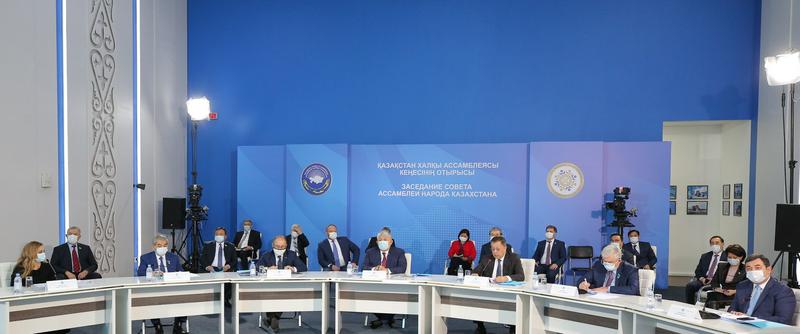NUR-SULTAN – The Assembly of the People of Kazakhstan (APK) nominated nine candidates for its deputy group in Majilis (lower house of Parliament) during the Dec. 11 APK council meeting, the press service of the assembly reported.

Photo credit: the APK.
Since 2007, the APK has had the right to appoint a deputy group of nine people that represents the assembly in Majilis. The APK members elect the deputy group by voting on Jan. 11 during the 28th session of the assembly in Nur-Sultan. The APK considers a candidate elected if he or she gets the votes of more than half of the present APK members, which comes out to 504 members.
APK member Sauytbek Abdrakhmanov is the only candidate who was elected as a Majilis deputy before. The APK also nominated chairpersons of Kurdish, Azerbaijani, Armenian, and Tatar-Bashkirs cultural associations.
Kazakhstan’s First President and APK Chair Nursultan Nazarbayev established the APK in 1995 to ensure peace in interethnic relations, strengthen socio-political stability, and improve cooperation between state institutions and civil society.
The council participants also discussed the assembly’s role in strengthening the country’s independence.
Kazakh Secretary of State Krymbek Kusherbayev stressed Nazarbayev’s speech during the Nov. 11 APK council meeting. Nazarbayev called for institutional changes in the assembly. Nazarbayev emphasized the need to develop a new inclusive policy to strengthen inter-ethnic relations within Kazakhstan and to “transform the ethnic and cultural diversity of Kazakhstan.”
Nazarbayev instructed the assembly to focus on five matters: developing the Rukhani Zhangyru (Modernisation of Kazakhstan’s Identity) program; developing the use of the Kazakh language as a unifying factor; “clearly define the understanding of the status of the Kazakh people as a state-forming entity;” promote values such as labor, responsibility, education, and professionalism; stop the spread of fake news regarding the rise of interethnic tension within Kazakhstan.
“This year, a huge amount of work has been done in a short time, aimed at changing approaches to the management of interethnic processes in the country,” Kusherbayev said. “They acquire a more institutionalized character. The assembly is restarting structurally and qualitatively as a trusted general civil, supra-political and nationwide institution.”

